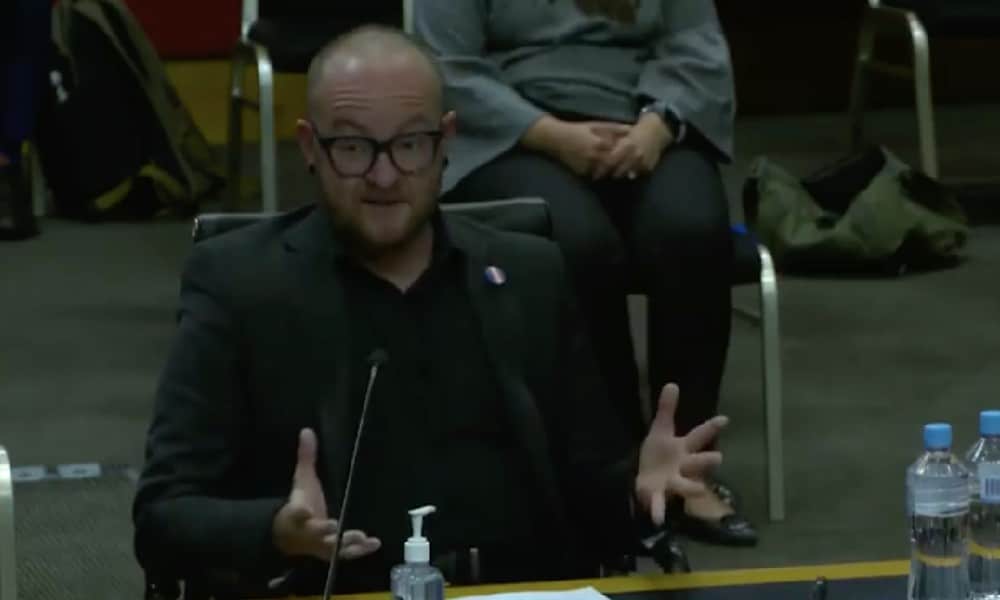Trans man Teddy Cook addressing a New South Wales parliamentary committee (Screenshot: LGBTI Rights Australia)
A trans health expert delivered a powerful testimony before ab Australian state parliament, declaring that trans people like him “deserve the dignity of being known”.
Teddy Cook was the sole transgender person to address a New South Wales parliamentary inquiry into a proposed law banning the promotion of “gender fluidity” in schools.
Cook is vice president of the Australian Professional Association for Trans Health (AusPATH), the country’s leading body for trans health professionals.
He told the hearing he was grateful for the opportunity to speak as an adult who was once a trans child, noting that he is likely the first trans person many lawmakers have ever spoken to.
“It is often the case that people who are most affected often are given the least opportunities to speak,” he began. “And even if my voice shakes, that’s OK because I’m still here.”
Cook reminded the committee that trans people are nothing new, that they have existed in First Nations cultures for centuries, and that trans youths who are supported in school have provably better outcomes.
“Whatever the outcome of this inquiry is, we know that we’ve always been here. We have always been in education settings. And we always will. It’s important that we know we are valid and that we offer the world an incredible gift,” he said.
“One thing is for certain though: We deserve the dignity of being known. The research globally, here and internationally, continues to show up the same results.
“Trans kids do better and they have a better quality of life when they are affirmed as who they are at school. When they can safely attend the school they want to go to as their affirmed gender, they do better. They just do better.”
From the beginning Cook made clear that he loves his trans identity, but he also spoke poignantly on the hardships of the trans experience: the shockingly high rates of violence and suicide, “the rejection and the turmoil”.
“I hear the stories of people who have ended their own lives – young people, who would prefer not to be alive than to live in a world that tells them that there is something wrong with them, that we are disordered, that we are a problem, that we are a challenge to deal with, that we are something to legislate against,” he said.
He also took the opportunity to debunk some damaging myths about the trans community, bluntly telling the parliament that “we are not the threat you imagine us to be.”
“I have got to say, in many ways, I really wish the trans community was as big as members of this committee seem to think that we are,” he said.
“You do seem to see us as a threat, which is interesting. I do hope that you know some actual trans people in your life. I hope that I am not the first one you have met.
“The reality is that we are not powerful enough to disrupt the culture of this country. Many of us, even though we are incredibly resilient, are just trying to get through the day. We are not the threat you imagine us to be.”
Teddy Cook also poked holes in the bill’s definition of “gender fluidity“, saying the hearing’s understanding of the term is flawed and not shared by the transgender community.
“The reality is, we’re not gender fluid,” he told them. “I’m sorry to tell you, I don’t think you spoke to any trans people when you were thinking about that definition.
“I’m trans, I started affirming my gender about 20 years ago. My gender has never been fluid. I’m a man. Most trans people are extremely clear about our gender; it’s not this fluid kind of idea that can change over time.”
Cook confirmed on behalf of AusPATH that the group “very clearly” rejects the proposed bill “in its entirety”.
His evidence was welcomed by fellow health professionals and parents of trans children, who have “inundated” him with messages of thanks and support.
“I have received hundreds of messages – from parents, from trans people, from cis people, from people who work with trans people,” Cook told the Guardian.
“I got one message saying, ‘Thank you so much for a voice for our kids,’ and stories – particularly from parents – telling me what it meant for their young person to see an adult trans person speaking so strongly. I have had a lot of messages from clinicians as well, they have been really lovely.”
